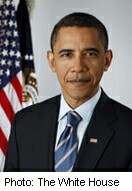
SATURDAY, Oct. 18, 2014 (HealthDay News) — President Barack Obama on Saturday asked Americans not to give way to panic over Ebola, and he repeated his opposition to a travel ban for flights from affected countries in West Africa.
In his weekly radio and Internet address, Obama said that Ebola, “is a serious disease, but we can’t give in to hysteria or fear – because that only makes it harder to get people the accurate information they need. We have to be guided by the science.”
Some lawmakers have called for a travel ban, but Obama believes such a move would be counterproductive. “Trying to seal off an entire region of the world – if that were even possible – could actually make the situation worse,” he said.
Obama’s words come a day after he appointed Ron Klain, a former chief of staff to Vice President Joe Biden and a trusted White House adviser, as Ebola “czar.”
His role: to oversee the federal government’s response to the small but anxiety-producing presence of the often lethal virus in the United States.
Klain has been out of public service since leaving Biden’s office during Obama’s first term. The White House said Klain would report to national security adviser Susan Rice and to homeland security and counterterrorism adviser Lisa Monaco, the Associated Press reported.
A lawyer, Klain also served as chief of staff for Vice President Al Gore.
Klain gained a reputation for skillful handling of high-stakes political challenges. For instance, he was the lead Democratic lawyer for Gore during the 2000 presidential election recount dispute, The New York Times reported.
On Thursday evening, Obama said “it may be appropriate for me to appoint an additional person [to oversee the Ebola response], not because they [federal health officials] haven’t been doing an outstanding job, really working hard on this issue, but they are also responsible for a whole bunch of other stuff.”
Obama said he was considering such a move “just to make sure that we are crossing all the t’s and dotting all the i’s going forward.”
Obama’s comments came after a Congressional subcommittee hearing where top federal health officials faced tough questions about their response to Ebola infections in the United States. The officials also defended their opposition to a ban on travelers from the West African nations of Guinea, Liberia and Sierra Leone, the sites of the worst Ebola outbreak in history.
To date, there has been one death and two infections from Ebola in the United States. The deceased was a native of Liberia who became infected in his home country before arriving in Dallas last month to visit relatives. The two infections involved two nurses at the Dallas hospital who helped treat the Liberian man.
The Ebola outbreak in West Africa has killed nearly 4,500 people out of an estimated 9,000 reported cases, according to the World Health Organization.
Also Thursday, the federal Centers for Disease Control and Prevention said it was widening its search for people who may have had contact with one of the nurses who treated Thomas Eric Duncan, the Liberian national and first patient ever diagnosed with Ebola in the United States. Nurse Amber Joy Vinson was part of the medical team that cared for Duncan at Texas Health Presbyterian Dallas, the focus so far of Ebola in the United States.
Vinson traveled by plane on Oct. 10 from Dallas to Cleveland to visit family members and returned to Dallas on Oct. 13. She said she had a slight fever before boarding the return flight to Dallas, but family members said she had appeared “remote and unwell” while in Ohio over the weekend, the Times reported.
The CDC said it was now tracking down passengers who took Frontier Airlines Flight 1142 from Dallas to Cleveland on Oct. 10. The agency had already been tracking passengers on her Oct. 13 flight back to Dallas.
CDC officials have said repeatedly that people infected with Ebola are not contagious until they show symptoms, such as fever and vomiting.
Meanwhile, the search continues for other health care workers at Texas Health Presbyterian Dallas who may have had contact with Duncan or his bodily fluids. CDC officials say Ebola can only be spread through contact with an infected person’s bodily fluids.
Federal officials said early Friday that a Dallas health care worker who handled a lab specimen from Duncan has quarantined herself on a Caribbean cruise ship and is being monitored for any signs of infection. The woman, who is on board with her husband, shows no signs of infection, the U.S. State Department said, the Associated Press reported.
At Thursday’s Congressional hearing, several of the nation’s top health officials faced blistering criticism of their handling of Ebola in the United States. And the officials reiterated their opposition to a ban on travelers from West African nations fighting Ebola.
Legislators asked tough questions about health officials’ response to the handling of the Duncan case, particularly since two intensive-care nurses who cared for him later contracted Ebola themselves.
Health officials have decided to move both nurses — Vinson and an infected colleague, Nina Pham — from Texas Health Presbyterian Hospital to other facilities in the United States with dedicated biocontainment units designed to treat deadly infectious diseases like Ebola.
Vinson has been relocated to Emory University Hospital in Atlanta, which has successfully treated two other patients with Ebola. Pham arrived Thursday night at a specialized U.S. National Institutes of Health medical center in Bethesda, Md.
Officials still have not determined how the two nurses became infected with the Ebola virus.
The nurses were moved from Texas Health Presbyterian, which has been criticized for its handling of the Duncan case, in part, to ease the burden on the hospital. The medical center has its hands full tracking dozens of other health care workers who may have been exposed to Ebola while treating Duncan, CDC Director Dr. Tom Frieden said Thursday.
“Texas Presbyterian is dealing with a difficult situation,” Frieden said at the Congressional hearing. “They are now dealing with at least 50 health care workers who may potentially have been exposed. That makes it quite challenging to operate, and we felt it would be more prudent to focus on caring for any patients who come in with symptoms.”
In response to lawmakers’ demands for a travel ban, Frieden said that keeping commercial air travel open with Guinea, Liberia and Sierra Leone — the epicenter of West Africa’s Ebola epidemic — will continue to strengthen efforts on the ground to contain the outbreak there.
Under a ban, people in the three West African countries would be tempted to slip across the border into a neighboring nation and fly to America from there, making it difficult or impossible to detect their entry into the United States, Frieden explained.
“We won’t be able to check them for fever when they leave,” he said. “We won’t be able to check them for fever when they arrive. We won’t be able to take a detailed history to see if they were exposed. When they arrive, we wouldn’t be able to impose quarantine as we now can if they have high-risk contact.”
Other officials on the panel supported Frieden’s position. They included Dr. Anthony Fauci, director of the U.S. National Institute of Allergy and Infectious Diseases, and John Wagner, acting assistant commissioner for the Department of Homeland Security’s customs and border protection field operations.
This united front did not blunt legislators’ demands for a travel ban.
“I just don’t understand [how] we can’t look at one’s travel history and say, ‘No, you’re not coming here, not until this situation’ — you’re right it needs to be solved in Africa, but until it is we should not be allowing these folks in. Period,” said Fred Upton, R-Mich., chairman of the House Energy and Commerce Committee.
More information
For more on Ebola, visit the World Health Organization.
Copyright © 2026 HealthDay. All rights reserved.

